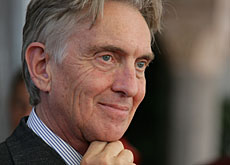
Next national exhibition could explore myth

The Gotthard Pass could become the hub of Switzerland's next national exhibition in 2020, according to the head of tourism in the southern canton of Ticino.
Marco Solari talks to swissinfo about how his plan could promote his canton, help create a stronger sense of Swiss identity and bring the country together.
Born and raised in Bern, his student years spent in Geneva, a professional life in Ticino and Zurich – Solari is considered by many people to be a builder of bridges, an idealist and a patriot.
His idea of a new exhibition in 2020, timed to coincide more or less with the opening of the new Gotthard rail tunnel, has proved controversial – not least because the financial disaster of the last exhibition in 2002 is still fresh in people’s minds.
swissinfo: How did you come up with the idea of a national exhibition at the Gotthard in 2020?
M.S.: I mentioned this idea because I was asked if I had any plans to promote Ticino. This is a canton with a threefold purpose. There’s Ticino playing its role on the Lugano-Milan axis as a satellite of Lombardy. There’s the Ticino of Lake Maggiore, with its need to focus on culture and conference-based tourism. And then there’s the Ticino looking northwards from Bellinzona.
It’s also an alpine area that needs to rethink its whole relationship with the Alps, and its population needs to have a belief in major projects. That’s how the idea came of staging a large-scale event in the region commemorating the opening of the tunnel, one of the key links between the north and south of Europe.
swissinfo: Switzerland is at the heart of Europe, in other words…
M.S.: Switzerland is at the heart of Europe and this new tunnel reinforces that role. I know there are those who say that the tunnel will do nothing for the people living in the mountains. That is precisely why it is a chance to rethink the relationship with the Alps, in terms of new opportunities for development, a new sense of belonging.
This 60-kilometre hole through the mountains will not just connect Zurich, Lugano and Milan. It will also make us closer to expanding central Europe to the east, and the Mediterranean area, bringing with it both the old tragedies – I’m thinking of refugees – and new challenges.
swissinfo: What does Switzerland need today?
M.S.: There’s a great need to believe in a major project. There’s a deep-seated need to bring together the Swiss as a nation. The response to my proposal suggests that the time is now ripe. The time has also come to bring the notion of of a nation created by its own determination back into focus.
Then there is a whole generation which is sick and tired of just hearing about money, managers’ salaries and materialism. These young people want to go beyond that; they want clear plans, realistic dreams.
There is this desire for something firm and concrete, but there is [also] a sense of needing a myth – a constant aspiration throughout human history. The Gotthard is not just a Swiss myth; it’s a European one as well, passed down by the great travellers. It is not just the solidity of the mountains, it’s also mobility and communication, protection and openness.
swissinfo: So what is the Swiss identity?
M.S.: The patriotism of the Swiss is and always has been rooted in their canton.
However, what unites us is a very distinctive political culture, a desire for grass-roots democracy, a predisposition to federalism… and the expression of a very strong republican sentiment which immediately crushes all ambitions for personal power.
The Swiss do not accept monarchs, individuals wielding excessive power, because they represent a threat to the subtle equilibrium that exists between groups. They prefer a humbler equality.
swissinfo-interview: Françoise Gehring in Locarno
Born in Bern in 1944, Marco Solari eaned a social sciences degree at Geneva University.
In 1972 he was appointed head of the Ticino tourist authority and in 1988 took on the role of government delegate for the 700th anniversary of the Swiss Confederation.
In 1992, Marco Solari joined Switzerland’s biggest distributor Migros as managing director. In 1997, he became vice-president of Ringier, one of the country’s leading publishers.
Since 2001 he has been the president of the Locarno film festival.
This year, he was also appointed president of canton Ticino’s tourist authority.
The Swiss have organised national exhibitions since 1883, with the aim of bringing together the Swiss and make them think. Each one has generated its fair share of criticism and opposition.
The sixth one – the last one to be held in 2002 – was delayed by a year after uncertainty surrounding finances and its content.
It was held around the three lakes of Murten, Biel and Neuchâtel, and was considered a financial flop.
It cost the government seven times more than the original budget of SFr130 million – about SFr1 billion.
The federal financial control instance said in June 2005 that the extra costs had been caused by bad preparation.
Expo.02 finally welcomed ten million visitors. The organisers claimed at the time that every second Swiss travelled to see at least one of the four sites spread between the towns of Biel, Neuchâtel, Murten and Yverdon, as well as 500,000. from abroad.

In compliance with the JTI standards
More: SWI swissinfo.ch certified by the Journalism Trust Initiative





























You can find an overview of ongoing debates with our journalists here . Please join us!
If you want to start a conversation about a topic raised in this article or want to report factual errors, email us at english@swissinfo.ch.